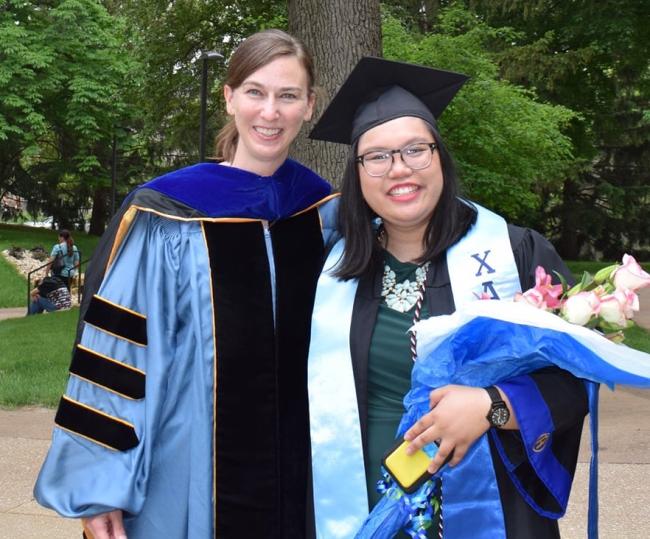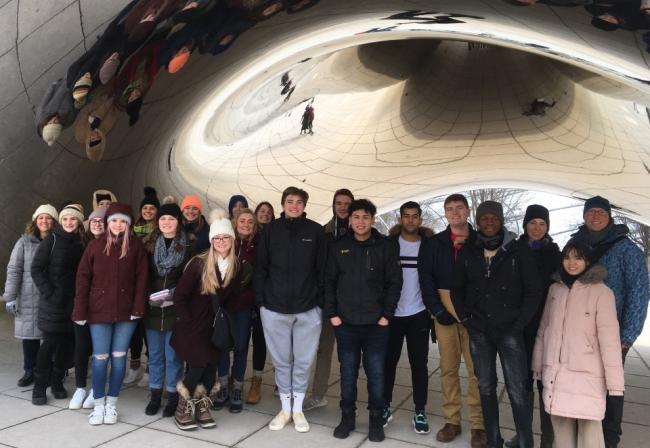Q&A with Dr. Sarah Lashley, assistant professor of environmental studies

Dr. Sarah Lashley and Thea Gonzales '20
Q: Why is this generation of students so interested in climate change and, in turn, environmental studies?
A: Our students are members of a generation born into a time when we are facing grand environmental problems, such as climate change, biodiversity loss, increased frequency and severity of natural disasters, and food, energy and water crises. They see a direct connection of these issues with human actions and social issues, such as human rights and justice issues.
They also see an urgent need to address these problems to secure a safe and healthy environment for themselves and future generations. The salience of these issues combined with the multiple ways through which students can study and address these challenges make the environmental field inviting.
There is a way for everyone who cares about the environment to make a difference.
I also think that environmental studies is attractive because it is an applied field. It’s a field where there is a very practical application of concepts and theory.
Q: What research projects are your students working on right now?
A: In addition to the terrific research assistant opportunities available through the Upper Mississippi Center and individual faculty, students also have access to a variety of different local internships.
Students have internships managing Augie Acres, Augustana’s own student-run garden project; assisting with community and economic development projects for the City of Rock Island; working on transportation issues with MetroLINK, the public transit provider in the Illinois Quad Cities; and assisting with watershed management projects with Partners of Scott County Watersheds, a local organization dedicated to improving water quality.
One of my current projects is: “Placing Neighbor Love: Reexaminations and Renewals of Augustana College’s Institutional Vocation.” Our team is composed of Augustana faculty and staff, led by Jason Mahn and Jane Simonsen, and is funded through the Network for Vocation in Undergraduate Education (NetVUE).
The purpose is to critically examine standard histories of the college in an effort to understand how these histories serve dominant groups at the expense of those at the margins, and then tell a reframed story in ways that better attend to marginalized voices.
We hope the project can help us better embrace our institutional calling to be a place of belonging for all on campus and to be a good neighbor to the Quad-Cities region. My specific role is to tell the contemporary story of how land has been acquired by the college and how the college's increased footprint has influenced the college's relationships with our Rock Island neighbors.
Q: What makes environmental studies at Augustana distinct?
A: We ask: how do people and the natural world interact, and how can we use this understanding to address complex environmental problems?
Our program stands out because of its emphasis on community-based experiential learning, meaning our students have a chance to make a difference in our community by tackling real-world environmental challenges. Our intentionally interdisciplinary approach and the breadth of other departments help strengthen our environmental course offerings.

Dr. Lashley's J-term class visited Chicago to learn about the challenges and opportunities of urban sustainability.
It’s the hands-on opportunities at Augustana that makes us special.
For example, the culminating experience is the senior capstone project. In this project, students help to investigate a question of interest to a community partner. Last year we worked with the City of Davenport to assess watershed quality and understand how local residents value and use the local creek.
It’s not just in the upper-level courses where we build in hands-on experiences though.
When I taught the introductory course, ENVR 101, during J-term, we spent a couple of days in Chicago to learn about the challenges and opportunities of urban sustainability, and we worked with the City of Geneseo to identify tree cost-share program models.
In our course on climate change and energy, students work with an online simulator to design their own policy scenarios to limit future global warming. In the simulator, students can try their own experiments and assumptions, and get immediate feedback on the likely impacts.
Q: Favorite class to teach?
A: I go back and forth, but right now I’m going to say Environmental Studies 387, which is environmental justice. I like teaching that class because it sits really at a praxis. It’s a combination of theory and practice. Students have the chance to see why theory matters and how it actually applies in situations of environmental studies and environmental justice.
It genuinely combines environmental issues with social justice issues.
And it brings a lot of students from different parts of campus together. Because there are no prerequisites for the class, there are students from sociology, geography, public health, but also students from other disciplines that might not otherwise make it into an environmental studies class.
In the class, we think about what justice is. What do we mean by justice? What are the drivers in environmental justice? What is leading us to have this differential environmental experience? Then students can really dive into it and ask “what do we do about it?”
Q: What is your vision for the future of environmental science at Augustana?
A: Ultimately, my vision is for students to develop the knowledge, skills and confidence needed to tackle pressing environmental problems. Environmental problems are wicked. Wicked problems have no definitive formulation, are in a constant state of change and are symptoms of other problems. There are no model solutions.
Wicked problems are beyond the control of one discipline, agency or actor. Instead, they require discussion amongst a host of actors, all of whom have different perspectives, goals, knowledge and means of communicating.
By working to develop students’ abilities to imagine desirable futures, describe and explain the interactions between social and ecological systems, communicate and collaborate with others with different perspectives and areas of expertise, and develop creative strategies for intervening and managing problems, we will have prepared students for a future in the environmental field.
Our commitment to interdisciplinary thinking and experiential learning makes this vision possible.
To grow this vision, I imagine further strengthening our commitment to using our own campus for sustainability research and experiential learning. We’ve done really good work on our own campus, from invasive species removal to greenhouse gas assessments, and we can build on these positive experiences to simultaneously provide experiential learning opportunities for students while also greening campus practices.
For example, students can develop evidence-based practices for reducing dining waste, which is one of our strategic sustainability goals.
Finally, once we can travel safely again, I imagine the development of more place-based courses, some of which may be in collaboration with other departments.
I’m hoping to develop a course focused on exploring the role of natural resources in promoting cooperation in the Middle East. I know my environmental studies colleagues are dreaming about similar field experiences.
